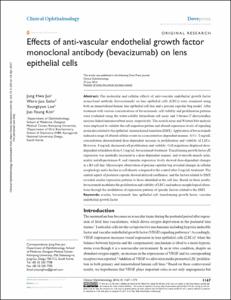Effects of anti-vascular endothelial growth factor monoclonal antibody (bevacizumab) on lens epithelial cells
- Keimyung Author(s)
- Jun, Jong Hwa
- Department
- Dept. of Ophthalmology (안과학)
- Journal Title
- Clinical Ophthalmology
- Issued Date
- 2016
- Volume
- 10
- Keyword
- Avastin; Bevacizumab; Lens epithelial cell; Transforming growth factor; Vascular endothelial growth factor
- Abstract
- The molecular and cellular effects of anti-vascular endothelial growth factor monoclonal antibody (bevacizumab) on lens epithelial cells (LECs) were examined using both an immortalized human lens epithelial cell line and a porcine capsular bag model. After treatment with various concentrations of bevacizumab, cell viability and proliferation patterns were evaluated using the water-soluble tetrazolium salt assay and 5-bromo-2′-deoxyuridine enzyme-linked immunosorbent assay, respectively. The scratch assay and Western blot analysis were employed to validate the cell migration pattern and altered expression levels of signaling molecules related to the epithelial–mesenchymal transition (EMT). Application of bevacizumab induced a range of altered cellular events in a concentration-dependent manner. A 0.1–2 mg/mL concentration demonstrated dose-dependent increase in proliferation and viability of LECs. However, 4 mg/mL decreased cell proliferation and viability. Cell migrations displayed dose-dependent retardation from 0.1 mg/mL bevacizumab treatment. Transforming growth factor-β2 expression was markedly increased in a dose-dependent manner, and α-smooth muscle actin, matrix metalloproteinase-9, and vimentin expression levels showed dose-dependent changes in a B3 cell line. Microscopic observation of porcine capsular bag revealed changes in cellular morphology and a decline in cell density compared to the control after 2 mg/mL treatment. The central aspect of posterior capsule showed delayed confluence, and the factors related to EMT revealed similar expression patterns to those identified in the cell line. Based on these results, bevacizumab modulates the proliferation and viability of LECs and induces morphological alterations through the modulation of expression patterns of specific factors related to the EMT.
- Keimyung Author(s)(Kor)
- 전종화
- Publisher
- School of Medicine
- Citation
- Jong Hwa Jun et al. (2016). Effects of anti-vascular endothelial growth factor monoclonal antibody (bevacizumab) on lens epithelial cells. Clinical Ophthalmology, 10, 1167–1174–1167–1174. doi: 10.2147/OPTH.S103443
- Type
- Article
- ISSN
- 1177-5467
- Appears in Collections:
- 1. School of Medicine (의과대학) > Dept. of Ophthalmology (안과학)
- 파일 목록
-
-
Download
 oak-2016-0086.pdf
기타 데이터 / 3.09 MB / Adobe PDF
oak-2016-0086.pdf
기타 데이터 / 3.09 MB / Adobe PDF
-
Items in Repository are protected by copyright, with all rights reserved, unless otherwise indicated.